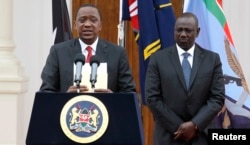Kenya’s president signed a controversial law Friday that grants sweeping new authority to security forces. The legislation was passed in a chaotic session of parliament over objections that it violates basic rights.
President Uhuru Kenyatta approved amendments to the country's existing security laws that grant police greater power to investigate and detain terror suspects and that impose strict rules on how media organizations report on security.
After signing, Kenyatta said the law would give the country some of the tools needed to fight terrorism.
"Its intent is one, just one: to protect the lives and property of all the citizens of this republic," he said.
Opposition to the amendments has been fierce.
Lawmakers came to blows over the bill as it came to a vote Thursday, shouting, fighting and throwing papers on the floor of the National Assembly. The session was suspended twice as security officers tried to restore calm to the chamber.
Kenyatta condemned members for disrupting the proceedings.
"I want to take this opportunity to thank our national assembly for having the presence of mind yesterday to pass the bill despite the deplorable conduct of a few individuals who seem oblivious to the threat that is upon our country at this point in time," he said.
Kenya's political opposition and civil society advocates have denounced the new laws as an affront to human rights, worrying that it will lead to an abuse of power by the state.
The law, as passed, dropped some of the more controversial measures in the original legislation. Those include a clause that would have given the government power to decide where and when political demonstrations could take place and another provision that would have allowed the national intelligence service to tap phones without a court order.
The ruling Jubilee coalition had been pushing for the legislation as a way to enable the country to better combat a rising threat of terrorism, originating mostly from the Somalia-based militant group al-Shabab.
Nine western countries, including the United States, this week expressed concerns about the bill. They said they support plans to improve security, but not at the risk of human rights infractions.





